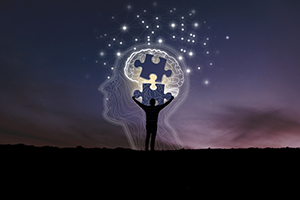News
Alzheimer's Awareness Month
Date: 11/01/22
 Alzheimer’s disease is a progressive brain disease that primarily affects older adults. It’s a type of dementia, a group of conditions with symptoms that affect memory, thinking and social abilities.[1] Alzheimer’s disease is the 6th leading cause of death in the U.S., and the 5th leading cause for those 65 and older.[2]
Alzheimer’s disease is a progressive brain disease that primarily affects older adults. It’s a type of dementia, a group of conditions with symptoms that affect memory, thinking and social abilities.[1] Alzheimer’s disease is the 6th leading cause of death in the U.S., and the 5th leading cause for those 65 and older.[2]
November is Alzheimer’s Disease Awareness Month. When President Reagan designated it in 1983, there were fewer than 2 million Americans with Alzheimer’s disease.[3] Now, the CDC estimates the number has risen to 5.8 million; by 2060, it may rise to 14 million.[4]
What is Alzheimer’s disease?
Although there are several different types of dementia, Alzheimer’s is the most common. It’s a disease that affects the parts of the brain that control thought, memory, and language. Alzheimer’s is a progressive disease, which means it gets worse over time. Eventually, it can affect a person’s ability to carry out daily activities like using the phone, preparing meals, taking their medications, or managing their finances.3 4 There is no cure for Alzheimer’s disease, but there are new treatments that can slow its progression.
What are the symptoms of Alzheimer’s disease?
It’s important to know that Alzheimer’s disease is not a normal part of aging. Many people experience forgetfulness at times as they age, but the memory loss experienced by people with Alzheimer’s is more significant and disrupts daily life. The CDC and Alzheimer’s Association identify these 10 warning signs of Alzheimer’s:[5]
- Memory loss that disrupts daily life. Forgetting events, repeating themselves, getting lost in a familiar place.
- Challenges in planning or solving problems. A person with Alzheimer’s may have trouble paying their bills or cooking familiar recipes.
- Difficulty with familiar tasks, such as cooking, driving, using a cell phone, or shopping.
- Confusion with time or place: losing track of dates or being unable to understand an event happening in the future.
- Trouble understanding visual images and spatial relations: having trouble with balance or judging distance, tripping, spilling or dropping things.
- New problems with words. Difficulty following or joining a conversation or having a hard time finding the word for something.
- Misplacing things and losing the ability to retrace steps: for example, putting the car keys in the washer
- Decreased or poor judgement: being the victim of a scam, paying less attention to hygiene, having trouble taking care of a pet.
- Withdrawal from work or social activities: not wanting to go to church or other activities, not being able to follow sports or other activities you know well.
- Changes in mood and personality: getting easily upset in common situations or being fearful or suspicious.
Not everyone with Alzheimer’s has all these symptoms and having one or more does not mean someone has Alzheimer’s. If you or a loved one have one or more of these symptoms, see a healthcare provider for evaluation.
Caregiver Support
In the U.S., more than 11 million people – 64% of whom are women – provide unpaid care for people living with dementia. In addition, 26% of caregivers are part of the “sandwich generation,” people who care for both aging parents and children.[6] If you’re one of these caregivers, taking care of yourself is one of the most important things you can do. Remember, if you don’t care of yourself, you can’t take care of anyone else. Here are some tips to help you manage self-care.[7]
- Get organized. Make to-do lists, and set a daily routine.
- Ask for help. Many people want to help but aren't sure how. Try making a list of ways others can help so you have concrete ideas when someone asks. For example, someone might pick up groceries or sit with the person while you do errands. It's ok to let others help!
- Maintain healthy habits. Eating healthy foods, getting enough sleep (7-9 hours), and exercising can improve your physical and mental health. Keeping up with your healthy habits will help you stay well, make you feel good, and improve your ability to deal with stress.
- Be sure to recharge. Take breaks each day, spend time with your friends, and keep up with your hobbies and interests. Setting time aside can be challenging, but taking a few minutes a day can help boost your mental health and better deal with stress.
- Join a caregiver's support group. Meeting other caregivers (online or in-person) may give you a chance to exchange stories and ideas.
- See your doctor regularly. Let your health care provider know that you're a caregiver, and mention if you have symptoms of depression or sickness.
- Build your skills. Search for classes on how to care for someone with an injury or illness. To find these classes try searching online, ask your doctor, or contact your local Area Agency on Aging at www.n4a.org.
Your EAP can help
If you are a caregiver for someone with Alzheimer’s disease and need help, contact your EAP. We can provide referrals to eldercare services, community resources, or a counselor at no cost to you.
[1] Dementia - Symptoms and causes - Mayo Clinic
[2] About Alzheimer's Disease (cdc.gov)
[3] Alzheimer’s Awareness Month 2022 | Discuss Alzheimer's This November (seniorliving.org)
[4] What is Alzheimer's Disease? | CDC
[5] 10 Warning Signs of Alzheimer's (cdc.gov)
[6] Alzheimer’s Care Partner Support | All For Alz
[7] Coping with Caregiving | NIH News in Health
.jpg)
